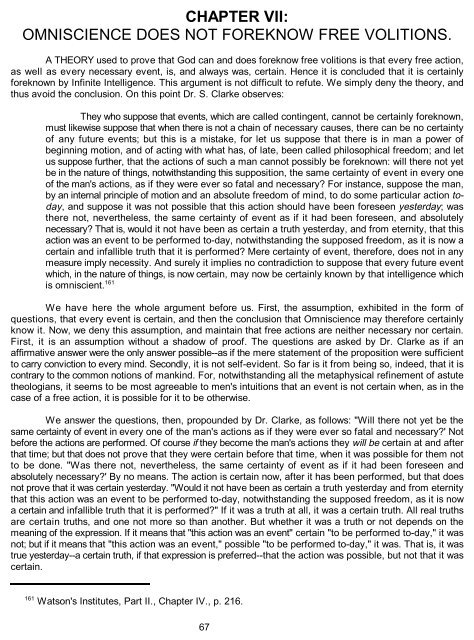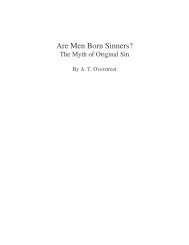Foreknowledge by Joel Hayes - Library of Theology
Foreknowledge by Joel Hayes - Library of Theology
Foreknowledge by Joel Hayes - Library of Theology
Create successful ePaper yourself
Turn your PDF publications into a flip-book with our unique Google optimized e-Paper software.
CHAPTER VII:<br />
OMNISCIENCE DOES NOT FOREKNOW FREE VOLITIONS.<br />
A THEORY used to prove that God can and does foreknow free volitions is that every free action,<br />
as well as every necessary event, is, and always was, certain. Hence it is concluded that it is certainly<br />
foreknown <strong>by</strong> Infinite Intelligence. This argument is not difficult to refute. We simply deny the theory, and<br />
thus avoid the conclusion. On this point Dr. S. Clarke observes:<br />
They who suppose that events, which are called contingent, cannot be certainly foreknown,<br />
must likewise suppose that when there is not a chain <strong>of</strong> necessary causes, there can be no certainty<br />
<strong>of</strong> any future events; but this is a mistake, for let us suppose that there is in man a power <strong>of</strong><br />
beginning motion, and <strong>of</strong> acting with what has, <strong>of</strong> late, been called philosophical freedom; and let<br />
us suppose further, that the actions <strong>of</strong> such a man cannot possibly be foreknown: will there not yet<br />
be in the nature <strong>of</strong> things, notwithstanding this supposition, the same certainty <strong>of</strong> event in every one<br />
<strong>of</strong> the man's actions, as if they were ever so fatal and necessary? For instance, suppose the man,<br />
<strong>by</strong> an internal principle <strong>of</strong> motion and an absolute freedom <strong>of</strong> mind, to do some particular action today,<br />
and suppose it was not possible that this action should have been foreseen yesterday; was<br />
there not, nevertheless, the same certainty <strong>of</strong> event as if it had been foreseen, and absolutely<br />
necessary? That is, would it not have been as certain a truth yesterday, and from eternity, that this<br />
action was an event to be performed to-day, notwithstanding the supposed freedom, as it is now a<br />
certain and infallible truth that it is performed? Mere certainty <strong>of</strong> event, therefore, does not in any<br />
measure imply necessity. And surely it implies no contradiction to suppose that every future event<br />
which, in the nature <strong>of</strong> things, is now certain, may now be certainly known <strong>by</strong> that intelligence which<br />
is omniscient. 161<br />
We have here the whole argument before us. First, the assumption, exhibited in the form <strong>of</strong><br />
questions, that every event is certain, and then the conclusion that Omniscience may therefore certainly<br />
know it. Now, we deny this assumption, and maintain that free actions are neither necessary nor certain.<br />
First, it is an assumption without a shadow <strong>of</strong> pro<strong>of</strong>. The questions are asked <strong>by</strong> Dr. Clarke as if an<br />
affirmative answer were the only answer possible--as if the mere statement <strong>of</strong> the proposition were sufficient<br />
to carry conviction to every mind. Secondly, it is not self-evident. So far is it from being so, indeed, that it is<br />
contrary to the common notions <strong>of</strong> mankind. For, notwithstanding all the metaphysical refinement <strong>of</strong> astute<br />
theologians, it seems to be most agreeable to men's intuitions that an event is not certain when, as in the<br />
case <strong>of</strong> a free action, it is possible for it to be otherwise.<br />
We answer the questions, then, propounded <strong>by</strong> Dr. Clarke, as follows: "Will there not yet be the<br />
same certainty <strong>of</strong> event in every one <strong>of</strong> the man's actions as if they were ever so fatal and necessary?' Not<br />
before the actions are performed. Of course if they become the man's actions they will be certain at and after<br />
that time; but that does not prove that they were certain before that time, when it was possible for them not<br />
to be done. "Was there not, nevertheless, the same certainty <strong>of</strong> event as if it had been foreseen and<br />
absolutely necessary?' By no means. The action is certain now, after it has been performed, but that does<br />
not prove that it was certain yesterday. "Would it not have been as certain a truth yesterday and from eternity<br />
that this action was an event to be performed to-day, notwithstanding the supposed freedom, as it is now<br />
a certain and infallible truth that it is performed?" If it was a truth at all, it was a certain truth. All real truths<br />
are certain truths, and one not more so than another. But whether it was a truth or not depends on the<br />
meaning <strong>of</strong> the expression. If it means that "this action was an event" certain "to be performed to-day," it was<br />
not; but if it means that "this action was an event," possible "to be performed to-day," it was. That is, it was<br />
true yesterday--a certain truth, if that expression is preferred--that the action was possible, but not that it was<br />
certain.<br />
161<br />
Watson's Institutes, Part II., Chapter IV., p. 216.<br />
67






